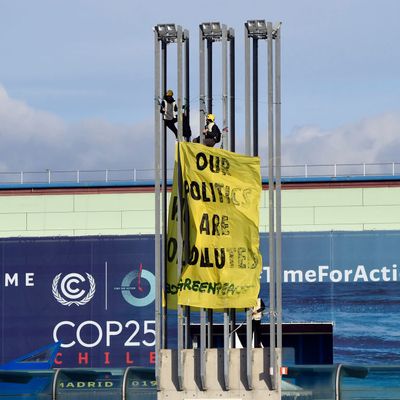
Though the direct effects of the Trump administration’s deregulate-and-run climate approach are quite tangible thus far— recent lows include undermining the science depended on for EPA studies and a substantial rollback of rules limiting emissions of methane — the very idea of a second Trump term has halted the plans of diplomats making progress on policy to reduce global emissions. At the annual United Nations Climate Change Conference (COP 25) in Madrid, the specter of a two-term Trump presidency helped derail the already wobbly conference, which ran two days long after negotiators could not reach a consensus on how to move forward without a compliant United States.
“[The U.S.] are not helping,” former French environment minister Laurence Tubiana told Politico. Tubiana, an architect of the 2015 U.N. agreement in Paris that set current emissions targets of 1.5 degrees of warming, added that other countries are “waiting for the U.S. election. This type of thing, which really is pretty stupid … creates an impact of ‘wait and see.’” Though President Trump announced the American withdrawal from the Paris goals in June 2017 and has done his best to stymie federal emissions cutbacks, the U.S. cannot formally leave the agreement until November 4, 2020, the day after the election.
Other roadblocks emerged at the 25th annual conference. As protestors like Extinction Rebellion dumped horse manure outside the venue, inside, a conflict bloomed between developing countries demanding that industrialized nations bear the brunt of emissions reductions for their historic output, as the latter requested that the former stop hitching their brisk economic growth to high carbon emissions. Ultimately, countries like China, India, Brazil, and Saudi Arabia balked on making ambitious new emissions cuts.
Without the leadership role of the United States, which sent no major political officials and hosted no public events, major goals of COP 25 — to write the rulebook for a global cap-and-trade market and to set a rubric for aiding developing countries dealing with climate crises — were not met. Frustration over the American absence was palpable, as a summary tweet from U.N. Secretary General António Guterres suggests:
“We’re in a very politically difficult time right now where we’ve got one key world leader denying climate change, so it’s very hard to get other countries to move forward when you’ve got such a critical country playing a spoiling role,” delegate Ian Fry of Tuvalu told Politico. “That’s the state of the world we’re in at the moment.”
The underwhelming conference comes shortly after two bleak reports in the past few weeks. In late November, the annual U.N. Emissions Gap Report stated that the world economy is expected to blow past the 1.5 degree Celsius ceiling, with global temperatures on pace to rise by as much as 3.9 degrees Celsius by 2100. And as global greenhouse gas emissions hit a record high in 2019, the National Oceanic and Atmospheric Administration reports that thawing permafrost in the arctic could already be releasing the equivalent carbon levels of Japan’s annual emissions.






























